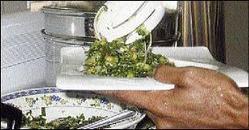
Rosalee Brown
Menopause is when there is cessation of menstruation and this varies from individual to individual. Natural menopause, which is not surgically induced, can result as early as the late 40s in some women to the mid-50s. There is a period of several years leading up to this point called the peri-menopause, in which many women will recognise that there are hormonal changes in their bodies.
One sign many women will complain about is increased weight around the waist and abdomen, commonly referred to as the middle-age spread. The hormone oestrogen is usually responsible for the characteristic laying down of fat in women around the hips, which is part of the preparation for reproduction but with the reduction of oestrogen, fat is stored around the waist. This, apart from being worrying to women because of aesthetic implications, has also worrying implications for our health.
Bad cholesterol
An enlarged abdomen and upper body increase the risk for chronic non-communicable diseases (such as high blood pressure, diabetes and cancers) and has been shown to increase women's low density lipoprotein cholesterol (LDL) or bad cholesterol, increasing their risk for various cardiovascular diseases. Incidence of cardiovascular diseases is higher in post-menopausal women because of the absence of the protection of oestrogen.
Weight gain in this phase of life can be prevented by lowering caloric intake while maintaining a healthy diet from a variety of food sources. Exercise is advised to help with weight reduction, improved bone mass and a feeling of well being. Women should also get involved in relaxing activities to help improve mood and help with stress reduction.
Specific information on food, nutrients and some herbs:
Include in your diet, food sources high in calcium, such as leafy greens, low-fat dairy, fish with bones, enriched soy and calcium supplements.
Consume a variety of fruits and vegetables of different colours for their antioxidant, folic and B vitamins potency.
Have adequate protein from lean meats, fish and legumes; excess can help to increase calcium excretion.
Include soy, flax and other plant foods rich in phyto-oestrogen in the diet.
Get most of your carbohydrate from complex unprocessed sources such as starchy root, fruits, grains and cereals; consume limited amounts of refined starches.
Consume less saturated fat such as from meats and more healthy fats from fish, nuts, seeds and avocado in moderation.
Reduce caffeine.
Restrict alcohol.
Reduce spices if they worsen discomfort and hot flashes.
Reduce sodium in the diet.
Consume adequate amounts of water daily.
Increase fibre from natural sources to, among other benefits, ensure regular bowel movements.
Avoid fad diets as improper nutrition can lead to feelings of fatigue which can worsen some of the symptoms of menopause.
Adopt a sensible eating plan from a wide variety of foods.
Increase daily activities by adding enjoyable and worthwhile tasks to your daily routine.
Keeping healthy and avoiding weight gain is a daily habit and, during this menopause it can be challenging, but it is one which can be successfully managed for your health and well being. There is much to enjoy during this period of your life and you want to preserve your health in order to have maximum benefit.

Leafy greens, such as callaloo, should be included in the diet of older persons. Here is a salad made with callaloo, lettuce, pear and other green raw foods. - photo by Avia Collinder
Rosalee M. Brown is a registered dietitian/nutritionist who operates Integrated Nutrition and Health Services; email: yourhealth@gleanerjm.com.

